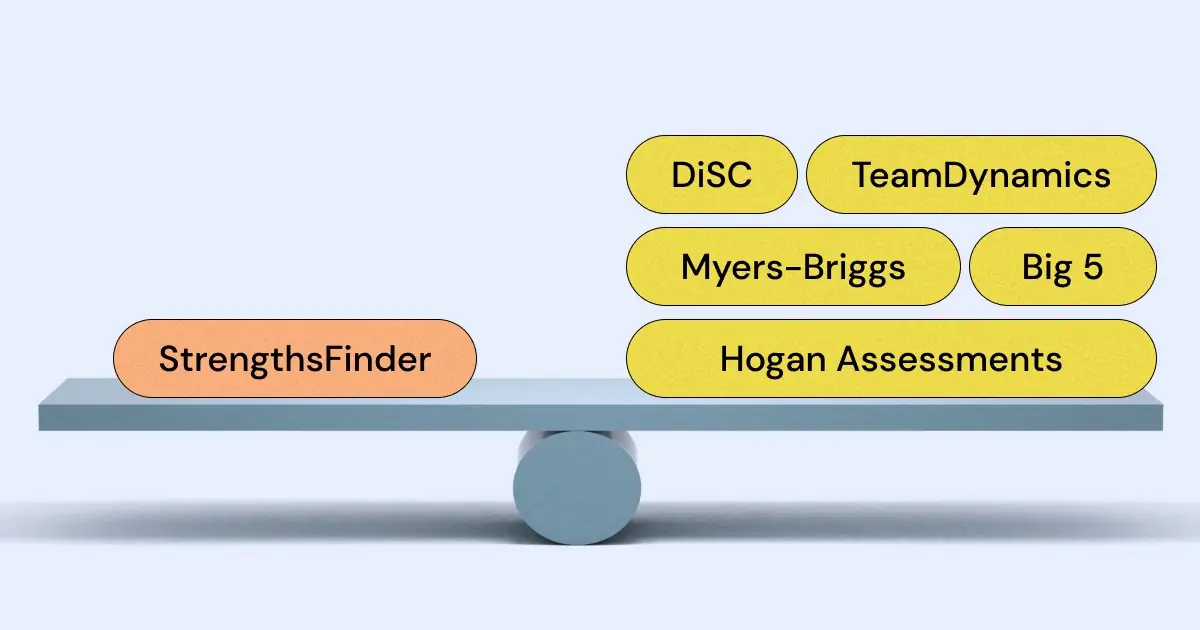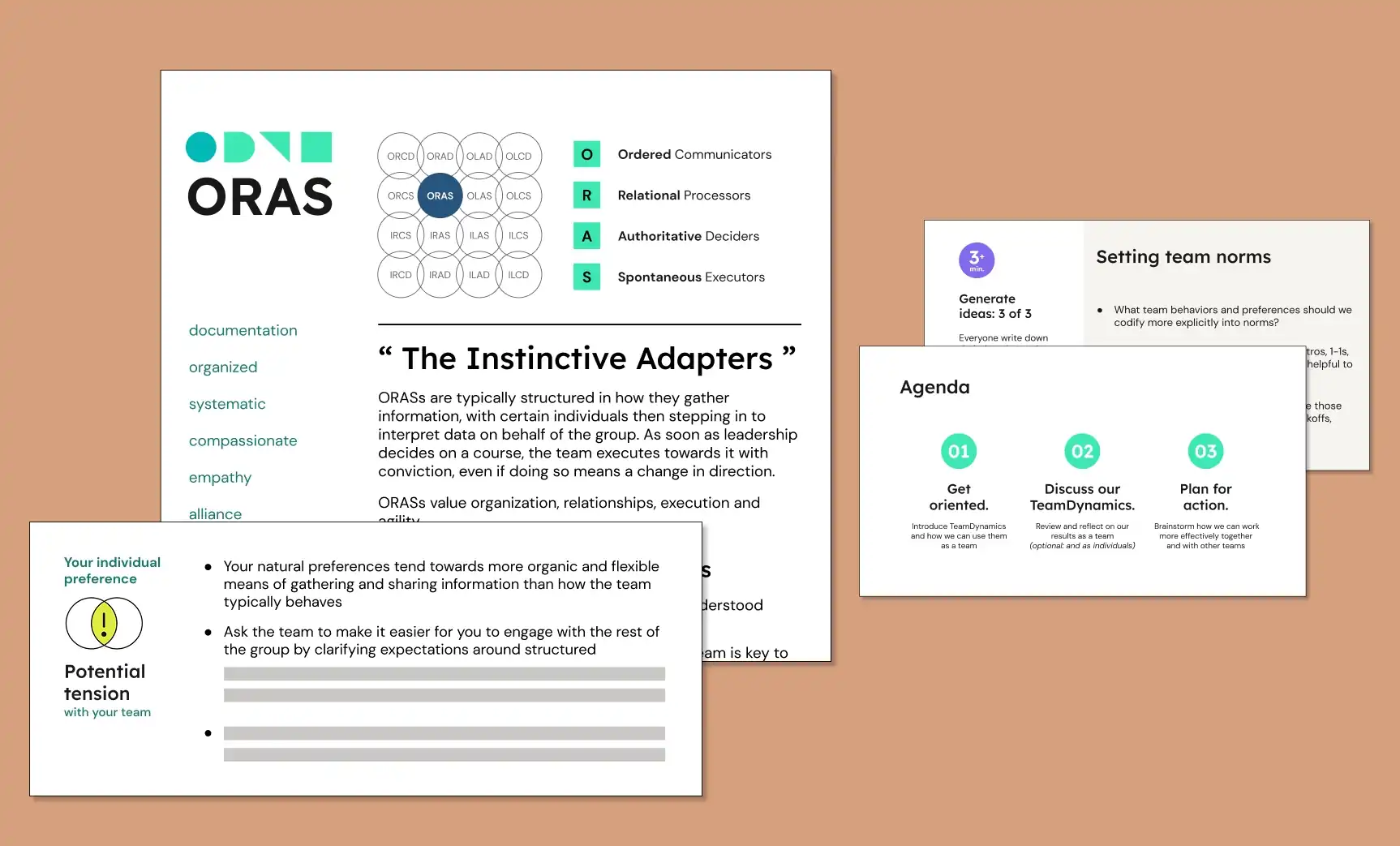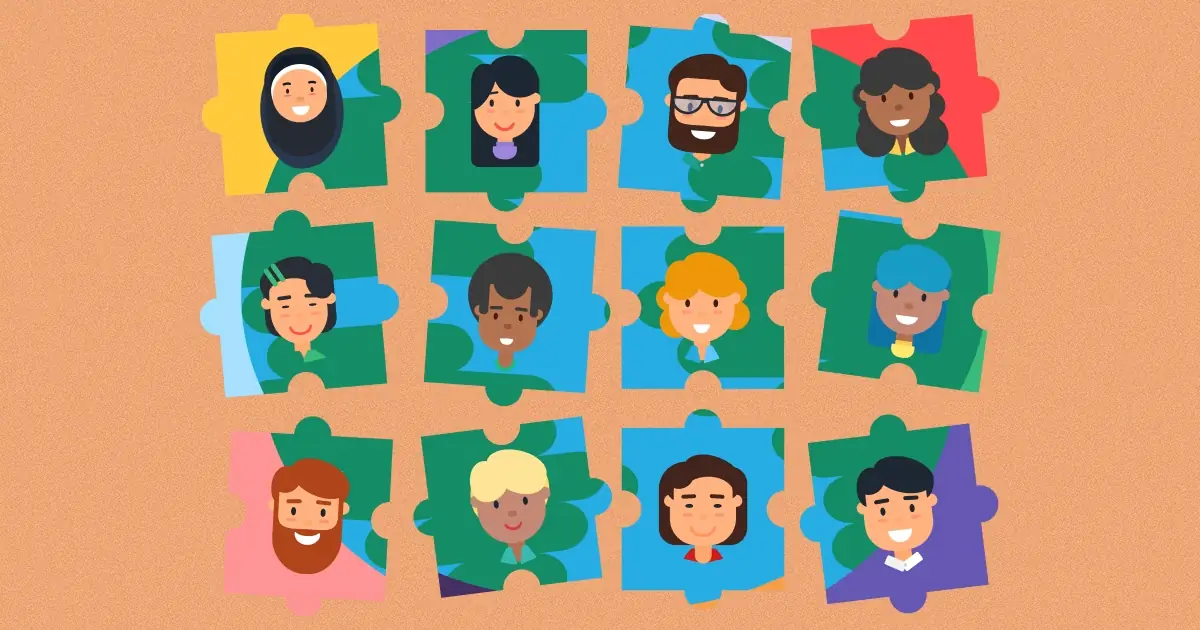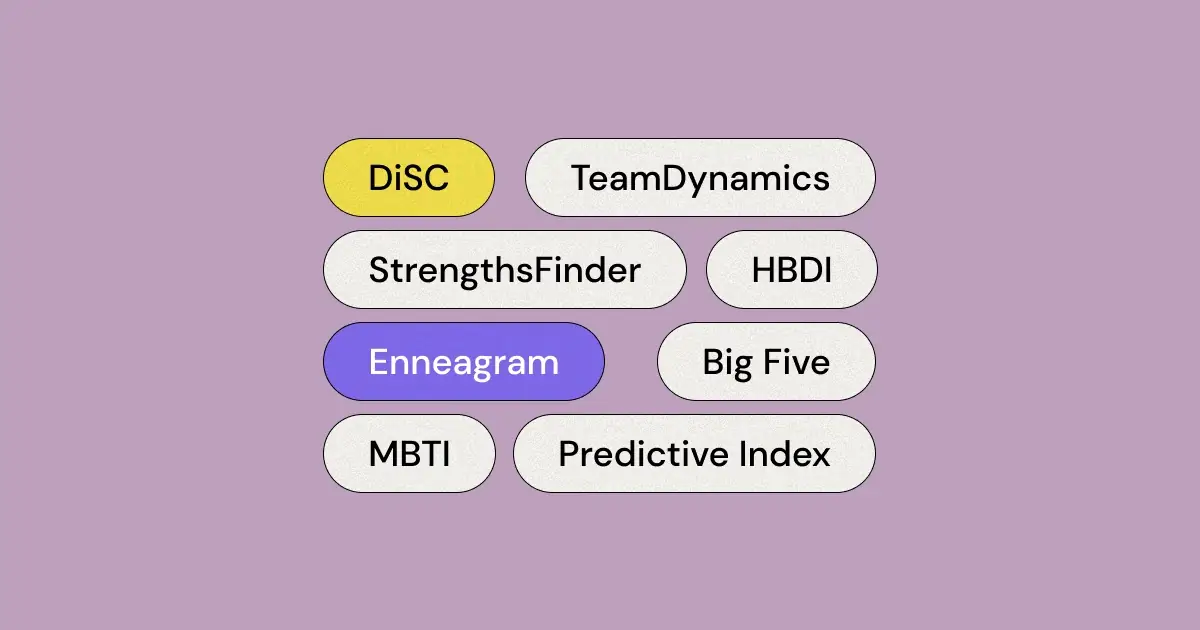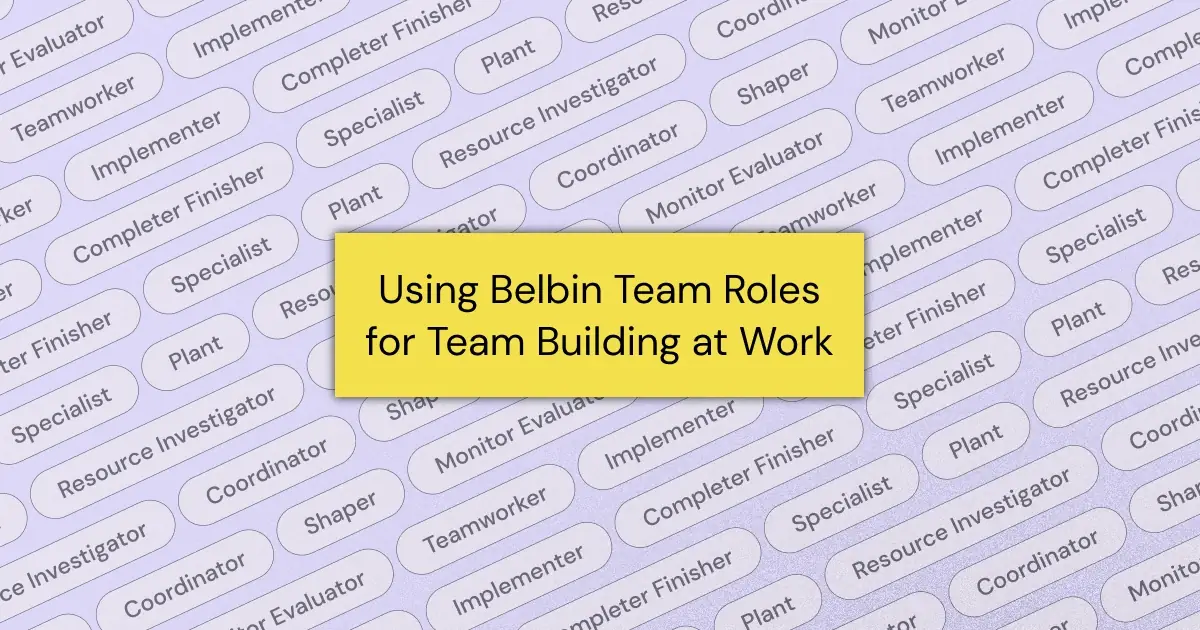StrengthsFinder, now known as CliftonStrengths, is a popular tool for identifying your natural talents. But it’s not the only option, or necessarily even the right one for you and your team. Whether you’re looking for a fresh perspective or a tool better suited for team dynamics, exploring alternatives can open up new ways to understand yourself and your team.
In this post, we’ll explore the five best alternatives to StrengthsFinder. These include well-known assessments like MBTI and DiSC, as well as deeper dives into personality with the Big Five and Hogan Assessments. We’ll also introduce you to TeamDynamics—a cutting-edge tool designed to assess not just individuals but entire teams, making it ideal for professional environments.
Read on to find out which of these assessments might be the right fit for you or your organization.
Alternative #1: Myers-Briggs Type Indicator (MBTI)
If you’re looking for an assessment that offers a comprehensive understanding of your personality and how you interact with others, MBTI is an excellent alternative to StrengthsFinder.
The Myers-Briggs Type Indicator (MBTI) is one of the most widely recognized personality assessments in the world. Based on Carl Jung’s theory of psychological types, MBTI categorizes individuals into 16 distinct personality types, each represented by a combination of four letters (e.g., INFP, ESTJ). These types are derived from preferences in four areas: Introversion vs. Extraversion, Sensing vs. Intuition, Thinking vs. Feeling, and Judging vs. Perceiving.
What Makes MBTI Special
MBTI stands out for its simplicity and accessibility. Unlike many other personality assessments, MBTI is easy to understand and apply, making it popular in both personal development and professional settings. Its focus on preferences rather than fixed traits allows individuals to see how they might adapt to different situations. The 16 personality types provide a comprehensive framework that helps people understand not only themselves but also how they interact with others.
MBTI vs. StrengthsFinder
While StrengthsFinder zeroes in on identifying and leveraging your top talents, MBTI offers a broader look at your personality as a whole. MBTI helps you understand your natural preferences and how these shape your behavior and decision-making. In contrast, StrengthsFinder is more focused on identifying specific strengths that you can develop. For those seeking a more holistic understanding of their personality, MBTI provides a wider lens, making it a great alternative to StrengthsFinder.
Practical Applications of MBTI
MBTI is widely used in various contexts, from personal development to team building. In the workplace, it helps teams understand each member’s communication style, decision-making process, and potential areas of conflict. Many organizations use MBTI to improve collaboration, enhance leadership skills, and create more harmonious work environments. Because it emphasizes understanding differences, MBTI is particularly effective for fostering better teamwork and resolving interpersonal issues.
{{inline-cta}}
Alternative #2: DISC Assessment
If your goal is to improve communication in a professional setting, DiSC is a highly effective alternative to StrengthsFinder.
The DiSC personality assessment is a popular tool used to understand behavior and communication styles. DiSC stands for Dominance, Influence, Steadiness, and Conscientiousness—the four primary dimensions that the assessment measures. Each individual receives a profile that highlights their predominant traits, helping them understand their natural tendencies in various situations, especially in the workplace.
What Makes DiSC Special
DiSC is known for its practical application, particularly in professional settings. It focuses on observable behaviors and communication styles, making it an actionable tool for improving teamwork, leadership, and workplace dynamics. Unlike more complex personality tests, DiSC is straightforward and easy to interpret, allowing individuals and teams to quickly apply insights to enhance productivity and collaboration.
DiSC vs. StrengthsFinder
While StrengthsFinder identifies your top talents, DiSC provides a clearer picture of how you behave in different contexts, especially in a team environment. DiSC’s focus on behavior and communication makes it particularly useful for improving workplace interactions. StrengthsFinder may highlight what you’re good at, but DiSC helps you understand how to effectively use your strengths in collaboration with others. For those looking to improve team dynamics and communication, DiSC offers a more targeted approach than StrengthsFinder.
Practical Applications of DiSC
DiSC is extensively used in organizational development, leadership training, and team building. It helps individuals understand their behavioral tendencies and how these impact their work relationships. Teams can use DiSC to identify potential areas of conflict, improve communication, and create a more harmonious work environment. DiSC’s clear and practical insights make it an invaluable tool for anyone looking to enhance workplace interactions and overall team performance.
Alternative #3: TeamDynamics
If your primary goal is to build stronger, more cohesive teams, TeamDynamics is a superior alternative to StrengthsFinder.
TeamDynamics is a unique personality assessment designed specifically for evaluating and enhancing team performance. Unlike traditional personality tests that focus solely on the individual, TeamDynamics takes a broader approach by assessing the collective behaviors of a team. It also examines how each team member’s preferences align with or differ from the established team norms, providing a comprehensive view of the team’s dynamics and potential areas for growth.
What Makes TeamDynamics Special
What sets TeamDynamics apart is its focus on the team as a whole. While most personality assessments are centered on individual traits, TeamDynamics offers insights into how a team functions together. It helps identify core behaviors and natural biases within the group by identifying your team as one of 16 team types, making it easier to understand how individual members contribute to or clash with the team’s overall dynamic. This focus on the collective makes TeamDynamics particularly valuable in professional environments where teamwork is crucial to success.
TeamDynamics vs. StrengthsFinder
While StrengthsFinder is excellent at identifying and developing individual talents, it doesn’t provide the same depth of insight into team dynamics as TeamDynamics. StrengthsFinder focuses on personal strengths, but TeamDynamics takes it a step further by showing how those strengths (and weaknesses) play out in a group setting. It's a personality test for team building. For those who want to improve team cohesion, understand group behavior, and create a more effective working environment, TeamDynamics offers a more targeted and comprehensive solution than StrengthsFinder.
Practical Applications of TeamDynamics
TeamDynamics is specifically designed for workplace settings where teamwork is essential. It is widely used in team-building exercises, leadership development, and organizational strategy. By providing a clear picture of how a team functions together, TeamDynamics helps leaders make informed decisions about team composition, role assignments, and conflict resolution. It’s an invaluable tool for any organization looking to enhance team performance and foster a collaborative work culture.
Alternative #4: The Big Five Personality Traits (Five Factor Model)
For a scientifically grounded and comprehensive view of personality, the Big Five is an excellent alternative to StrengthsFinder.
The Big Five personality traits, also known as the Five-Factor Model (FFM), is a widely respected framework in psychology for understanding human personality. The Big Five measures individuals on five key dimensions: Openness to Experience, Conscientiousness, Extraversion, Agreeableness, and Neuroticism (OCEAN). These traits provide a comprehensive view of an individual’s personality, capturing a wide range of behaviors and preferences.
What Makes the Big Five Special
The Big Five is valued for its scientific foundation and broad applicability. Unlike many other personality assessments, the Big Five is based on extensive research and is considered one of the most reliable and valid models of personality. Its focus on five broad dimensions allows for a nuanced understanding of personality, making it useful in both academic research and practical applications. The Big Five provides deep insights into how individuals are likely to behave across different situations, offering a well-rounded view of personality.
Big Five vs. StrengthsFinder
While StrengthsFinder is geared towards identifying and leveraging individual talents, the Big Five offers a more comprehensive analysis of personality as a whole. StrengthsFinder focuses on what you’re good at, but the Big Five helps you understand your personality across a broader spectrum, including how you handle stress, your level of creativity, and your social interactions. For those looking for a thorough and scientifically-backed assessment, the Big Five offers a deeper, more holistic understanding of personality than StrengthsFinder.
Practical Applications of the Big Five
The Big Five is used in a variety of settings, including psychology, education, and the workplace. It helps individuals and organizations understand personality traits that impact job performance, team compatibility, and leadership potential. Because of its broad scope, the Big Five is particularly useful in situations where a deep and nuanced understanding of personality is needed. It’s often used in recruitment, personal development, and team dynamics to ensure the right fit and to enhance performance.
Alternative #5: Hogan Assessments
For organizations seeking a predictive and workplace-focused personality assessment, Hogan Assessments is a superior alternative to StrengthsFinder.
Hogan Assessments is a suite of personality assessments designed for the workplace. Unlike many other personality tests, Hogan focuses on predicting workplace performance by evaluating personality traits that impact job success. The assessments include measures of normal personality (Hogan Personality Inventory), derailment risks (Hogan Development Survey), and core values (Motives, Values, Preferences Inventory), providing a comprehensive view of an individual’s potential in professional settings.
What Makes Hogan Assessments Special
What sets Hogan Assessments apart is its focus on workplace outcomes. The Hogan system is grounded in decades of research and is specifically designed to predict how personality influences job performance, leadership potential, and organizational fit. Its predictive power makes it a preferred tool for talent management, leadership development, and succession planning. The depth and specificity of Hogan Assessments make it an invaluable resource for organizations looking to make data-driven decisions about their employees.
Hogan Assessments vs. StrengthsFinder
While StrengthsFinder identifies your top talents and strengths, Hogan Assessments takes a more comprehensive approach to understanding how your personality affects your work performance. StrengthsFinder is great for personal development, but Hogan provides insights into potential strengths and risks in a professional context, including how you might perform under stress or in leadership roles. For organizations focused on aligning talent with business objectives, Hogan Assessments offers a more targeted and predictive approach than StrengthsFinder.
Practical Applications of Hogan Assessments
Hogan Assessments are widely used in talent management, leadership development, and hiring processes. They help organizations identify high-potential employees, mitigate risks associated with leadership derailment, and ensure that employees are aligned with the company’s values and culture. By offering a detailed analysis of personality traits that directly impact job performance, Hogan Assessments provide actionable insights that drive better hiring decisions and more effective leadership development.
Comparing the Top 5 Alternatives to CliftonStrengths
So which is the right alternative to StrengthsFinder for you and your team? Take a look at this simple comparison table.
| Tool |
Primary Focus |
Pricing |
Best For |
Key Strengths |
| Myers-Briggs Type Indicator (MBTI) |
Psychological Preferences |
One-time Payment |
Individuals looking for deep psychological insights |
16 personality types, useful for communication and conflict resolution |
| DiSC Assessment |
Behavior and Communication Styles |
Subscription/One-time Payment |
Individuals needing actionable communication insights |
Practical and easy to use, focuses on behavior and communication |
| TeamDynamics |
Team Behavior |
One-time Payment |
Organizations focused on team effectiveness and cohesion |
Assesses entire team, identifies collective behaviors and norms |
| Big Five Personality Traits (Five Factor Model) |
Comprehensive Personality Traits |
Free/One-time Payment |
Individuals seeking a scientific framework |
5 broad traits, scientifically robust, useful for individual personality traits |
| Hogan Assessments |
Workplace Performance Prediction |
Subscription |
Organizations focusing on leadership and succession planning |
Predicts job performance, leadership potential, risk factors |
Conclusion
StrengthsFinder is a valuable tool for identifying and developing individual talents, but it may not be the best fit for every situation, especially in the workplace. The alternatives we’ve explored—MBTI, DiSC, TeamDynamics, Big Five, and Hogan Assessments—each offer unique strengths that can provide deeper insights and more practical applications, depending on your goals.
Want to hold a team building workshop using CliftonStrengths? Check out our free downloadable StrengthsFinder team building resources!
MBTI and DiSC excel at improving communication and understanding within teams, making them great for enhancing interpersonal dynamics. The Big Five provides a scientifically robust and comprehensive view of personality, while Hogan Assessments focuses on predicting workplace performance and identifying leadership potential.
However, if your primary goal is to build stronger, more cohesive teams, TeamDynamics stands out as the most effective choice. Unlike the other assessments, TeamDynamics is specifically designed to evaluate how teams function together, identifying collective behaviors and how individual preferences align with or diverge from team norms. This makes it an invaluable tool for organizations looking to foster collaboration, improve team performance, and create a more harmonious work environment.
In most workplace settings, where teamwork and collaboration are key to success, TeamDynamics offers a targeted, comprehensive approach that other personality assessments simply can’t match.


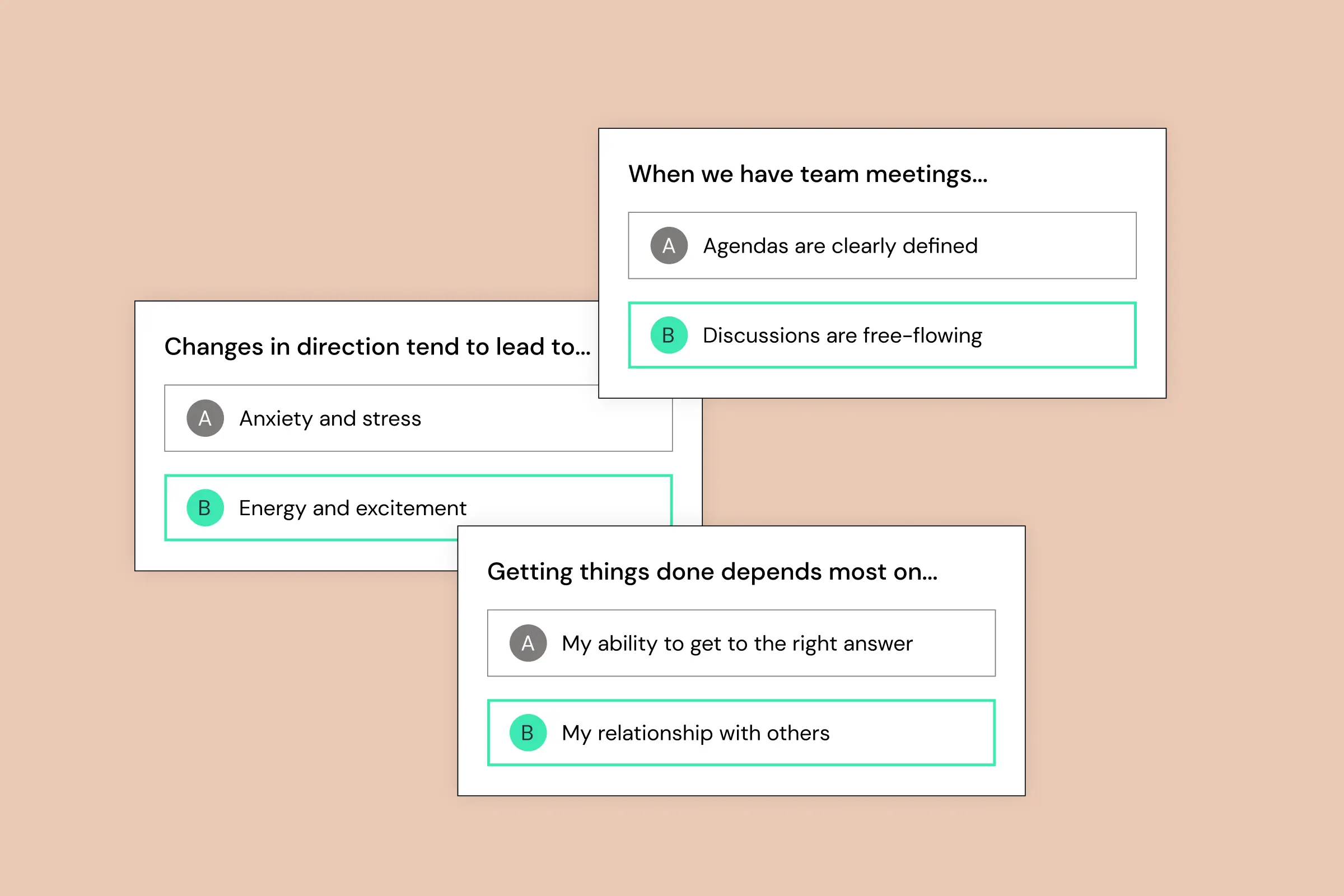

.png)
